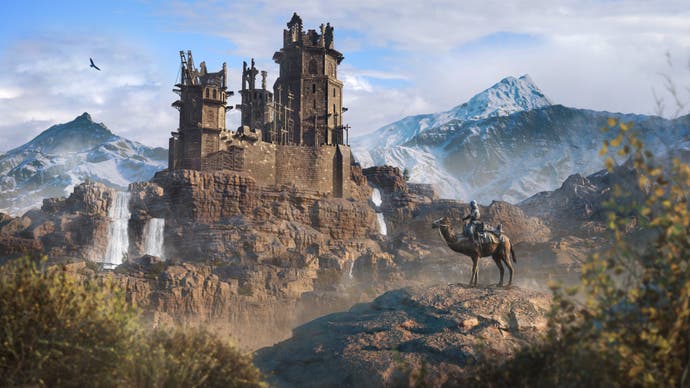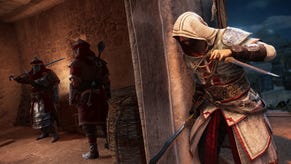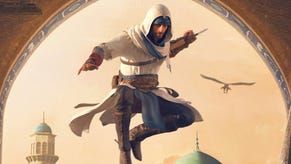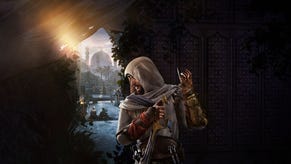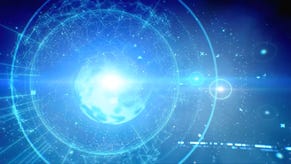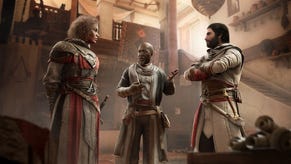Assassin's Creed Mirage ending explained
Fight club.
Assassin's Creed Mirage might be a leaner game than the past few Assassin's Creed epics, but it still provides its own fair share of funky goings on that may not make much sense to newcomers.
I loved Mirage's finale, which lifted things just as Baghdad's exploration and investigation loop started to feel a little over-familiar. But I was also left wondering how more casual players - the same ones drawn in by the promise of a more back-to-basics experience - would fare with the game's typically sci-fi finale, and the revelations about Mirage's main character that anyone who played 2020's Assassin's Creed Valhalla would already have been aware of.
So let's talk about all of that, and hopefully puzzle out what it all means. Full spoilers lie ahead for Assassin's Creed Valhalla, Assassin's Creed Mirage, and also the movie Fight Club.
So, what on earth happened at the end?
Let's break it down bit by bit. Mirage's ending boasts a string of reveals, including the identity of Basim (though this won't be a surprise if you played Valhalla), a twist concerning the true nature of his childhood friend Nehal, and the link between Basim's creepy jinni figure and the sci-fi technology found underneath Alamut.
Before all that, we also see the reveal of Mirage's top-most assassination target Qabiha, who sets off the chain of events shown in Mirage's big finale.
Remind me who Qabiha is and what her role was?
Qabiha was the chief consort of Baghdad's former ruler, the chap who you saw Nehal stab in the palace at the very beginning of the game. She's been pulling the strings around the city as the local leader for the Order of Ancients, the secret organisation that later rebrands as the Templars.
She's well-versed in knowledge of the Isu, Assassin's Creed's mysterious precursor race, and knows Basim can activate the Isu memory disc held in the palace. It's for this reason she attempts to reason with Basim before she in turn is stabbed by Roshan.
What was that hologramatic Isu CD-ROM?
They're called Memory Seals, and they were made by Isu to record past events and later replay them as holograms. They've popped up before, though not since the Desmond-era of Assassin's Creed - so this is a nice throwback. It's not clear how Qabiha obtained the one Basim initially gets hold of, or what Isu memories were stored on it.
While we're talking Memory Seals, there's a great Easter egg here involving the game guide to Assassin's Creed Revelations. There, it notes that the Memory Seals that Altair uses to record himself for Ezio were taken from the same vault under Alamut. So yes, the same CD-ROMs that Basim sees here are the ones Altair collects, centuries later.
Why did Roshan and Basim fight over whether to open the vault? And what were Qabiha's plans?
Basim wanted to open the vault to discover the truth about his identity - that he is a reincarnated Isu (he's the Norse god Loki, as revealed in Valhalla) and therefore able to activate and interact with Isu technology.
Qabiha wanted to use Basim as a key to access this technology, which aligns with the Order of the Ancients' general aim to control humanity and bring order through the use of Isu advancements.
Roshan believed the Isu knowledge should stay buried, and tried to convince Basim he could build a future free from all that, not dictated by the past. Basim disagreed, perhaps driven by his inner Loki, but also by anger at Roshan witholding what she knew of the vault previously.
Doesn't Roshan witholding information contradict the Assassins (or Hidden Ones) being all about free will?
Yes, and it speaks to a core contradiction of the group, who celebrate free will but also adhere to a set of guidelines on it, while answering to a hierarchy of leaders. This is something explored in various other games, and makes Roshan an interesting figure here.
Mirage's ending offers something of an inversion of the typical Assassin versus Templar roles. Qabiha is freely offering to share knowledge with Basim (albeit for her own ends), while Roshan is attempting to control Basim's path by keeping him from the truth (albeit for his own good).
Roshan even states that the Alamut vault is "forbidden ground" - interesting language for the mentor of a group which routinely claims "everything is permitted".
What else do we know about Roshan? And what happens to her afterwards?
Roshan compares herself to Basim and notes that she too had suffered before joining the Hidden Ones (in a note found in Alamut, it's suggested she's the victim of abuse while younger), and has survived now by devoting everything in her life to the Hidden Ones.
She believes Basim's own literal demons are ones he can also learn to endure - something she tells him in perhaps the best dialogue in the whole game: "You are not the first to walk the shadows broken, Basim. Stitch your shattered pieces into a whole. Pour your pain into the brotherhood... Come home to us. No more than a man. But no less than our brother."
Roshan is seen leaving the Hidden Ones - or at least the Alamut branch of them - after Master Rayhan sides with Basim. But she remains a committed member, and later visits Eivor in Valhalla (in a post-game mission released to promote Mirage).
Let's move on. What was the machine thing Basim discovered in the vault?
It's unclear how much of his prior life Basim remembers - the suggestion is not a great deal - but it's clear he knows enough to recognise the Alamut vault as an Isu prison in which he was held for some time.
Knowing his true nature as Loki, it's easy to imagine him doing something deemed worthy of being put behind bars - or rather, inside the Isu's ominous-looking machine, which was clearly designed to keep Loki and others in painful captivity.
So what was Basim's jinni?
Basim states that the jinni was a physical manifestation of his past trauma, caused by this imprisonment. The understanding of what the vault was lets him reconcile with this trauma, apparently freeing him from it. Still, Basim remains incensed by the idea there may be others at large to be held accountable for being imprisoned. Mirage ends with Basim swearing to go find them in the New World - England, and then eventually, in America.
Isn't it a coincidence that Loki was reincarnated as someone who lived very close to where he was once imprisoned, tens of thousands of years before?
Yes.
And someone who also meets several of his fellow Isu later in life?
Yes. It's either a small world, or there may be some magical mystery Isu hand-wavey stuff going on.
How does this fit with what we saw of Basim in Valhalla?
Basim travels to England in his later life once he meets Sigurd, the brother of Valhalla's main character Eivor. Both Sigurd and Eivor are also reincarnated Isu who knew Loki - they're Odin and Tyr - and he is not happy to see them at all.
Basim's pledge to hunt them down certainly strikes a villainous note. It may feel a little jarring - he's the star of the game and an Assassin (who are the good guys, right?) - but he's also now on his path to becoming Valhalla's main antagonist.
It's interesting to see the cracks forming here, in how others see the Hidden Ones' creed - the dying Nur, the strict Roshan - contrasted with Basim's own desire for knowledge about himself and own reason for liberating Alamut, which is simply to get into the vault below.
Are there any other Easter eggs for Valhalla players?
Good question! It's worth making sure you've completed all of the game's Tales of Baghdad missions. They add some fun extra flavour and one lets you meet a young boy named Hytham, a wannabe Assassin who travels with Basim to England in later years.
Lastly then, what's the deal with Nehal?
In a plot twist straight out of Fight Club, Nehal is revealed to be a manifestation of Loki's personality within Basim, seemingly there but invisible in reality - a mirage, if you will. (This twist got spoiled for me, and the number of times I then saw the game going out of its way to state the "close" and "unique" nature of their friendship then became rather noticeable).
Inside the Isu vault, Nehal states she has been there before, recalling her memories as Loki and helpfully acting as a guide. Basim opens the Isu prison device and sees her trapped inside - cementing her as both a figment of his mind but also her true identity as Loki, who was once imprisoned within. (It seems likely this prison device was designed on purpose to look similar to an Animus, which makes me wonder whether the Memory Seals were used to store thoughts or memories extracted from the prisoners.)
After Basim makes peace with his jinni, he then is shown to merge with Nehal herself, suggesting the Basim we see going forward is now fully aware of his prior Isu incarnation, and that both parts of his psyche are now at the controls.
So, is Loki evil? Is Basim now evil too?
Valhalla painted a rounder picture of Loki than we get in Mirage - and while he spends a lot of time as that game's antagonist, it's fair to say there's more to it than that. And while we see Basim/Loki speak vengefully here - swearing justice on others who imprisoned him - it's important to remember what else we've seen of him as Nehal.
It was Nehal who held Basim back from killing Roshan, and in the present day the now re-reincarnated Loki is hanging out with Assassin mentor William Miles.
Perhaps it's easiest to say that the Basim at the end of Mirage is changed. In a nice touch, his eagle Enkidu is shown to notice this difference in its master, scratching Basim's cheek rather than landing once again on his shoulder.
Phew. I think that's everything - though what was that I saw about a leaked post-credits scene?
A further spoiler warning here, for narrative elements in Mirage file's but not (yet) viewable. Earlier this week, a purported post-credits cutscene was posted online teasing what looked to be a major plotpoint for the future of Assassin's Creed. (Eurogamer asked Ubisoft for comment about this, but the publisher is keeping schtum.)
In a huge twist, that cutscene features a conversation between two Animus operators in the far future - discussing not only Basim's era but also our own 21st century present as "ancient history". You can read more about all that here.
